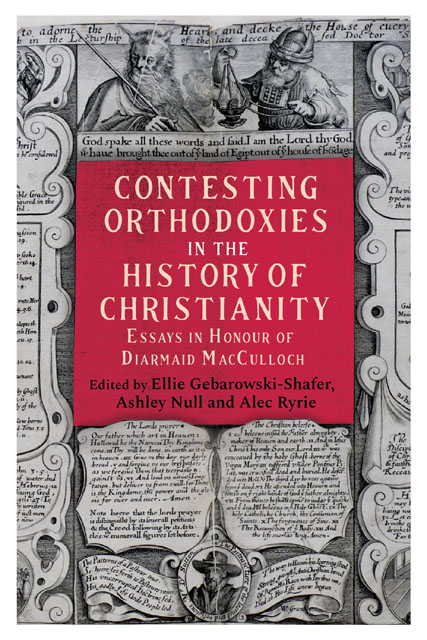Book contents
- Frontmatter
- Contents
- List of Illustrations
- List of Contributors
- List of Abbreviations
- Introduction
- 1 ‘Jewish Christianity’ in Antiquity: Meaningless Category or Heuristic Irritant?
- 2 ‘Sola Fide’: the Wrong Slogan?
- 3 Both Cromwellian and Augustinian: the Influence of Thomas Cromwell on Reform within the Early Modern English Austin Friars
- 4 Lex, Rex and Sex: The Bigamy of Philipp of Hesse and the Lutheran Recourse to Natural Law
- 5 The Authority of Scripture in Reformation Anglicanism: Then and Now
- 6 Orthodoxy and Heresy in the Post-Reformation
- 7 Profanity and Piety in the Church Porch: the Place of Transgression in Early Modern England
- 8 Writing on the Walls: Word and Image in the Post-Reformation English Church
- 9 The Myth of the Church of England
- 10 Mysticism, Orthodoxy and Reformed Identity before the English Revolution: the Case of John Everard
- 11 Sacrilege and the Sacred in England’s Second Reformation, 1640–1660
- 12 ‘I had not the patience to be quiet’: Arthur Bury and The Naked Gospel
- 13 ‘A soul-corrupting indifferentism’: the Intellectual Development of Benjamin Henry Latrobe
- 14 Newman, Dogma and Freedom in the Church
- 15 ‘Tommy, ’ow’s yer soul?’ Reconsidering Religion and the British Soldier
- 16 The King James Vulgate
- 17 The Myth of the Anglican Communion?
- Select bibliography of Diarmaid MacCulloch’s scholarly publications
- Bibliography
- Index
- Tabula Gratulatoria
- Studies in Modern British Religious History
3 - Both Cromwellian and Augustinian: the Influence of Thomas Cromwell on Reform within the Early Modern English Austin Friars
Published online by Cambridge University Press: 09 January 2024
- Frontmatter
- Contents
- List of Illustrations
- List of Contributors
- List of Abbreviations
- Introduction
- 1 ‘Jewish Christianity’ in Antiquity: Meaningless Category or Heuristic Irritant?
- 2 ‘Sola Fide’: the Wrong Slogan?
- 3 Both Cromwellian and Augustinian: the Influence of Thomas Cromwell on Reform within the Early Modern English Austin Friars
- 4 Lex, Rex and Sex: The Bigamy of Philipp of Hesse and the Lutheran Recourse to Natural Law
- 5 The Authority of Scripture in Reformation Anglicanism: Then and Now
- 6 Orthodoxy and Heresy in the Post-Reformation
- 7 Profanity and Piety in the Church Porch: the Place of Transgression in Early Modern England
- 8 Writing on the Walls: Word and Image in the Post-Reformation English Church
- 9 The Myth of the Church of England
- 10 Mysticism, Orthodoxy and Reformed Identity before the English Revolution: the Case of John Everard
- 11 Sacrilege and the Sacred in England’s Second Reformation, 1640–1660
- 12 ‘I had not the patience to be quiet’: Arthur Bury and The Naked Gospel
- 13 ‘A soul-corrupting indifferentism’: the Intellectual Development of Benjamin Henry Latrobe
- 14 Newman, Dogma and Freedom in the Church
- 15 ‘Tommy, ’ow’s yer soul?’ Reconsidering Religion and the British Soldier
- 16 The King James Vulgate
- 17 The Myth of the Anglican Communion?
- Select bibliography of Diarmaid MacCulloch’s scholarly publications
- Bibliography
- Index
- Tabula Gratulatoria
- Studies in Modern British Religious History
Summary
Orthodoxy is not an abstract phenomenon; it always has a context, and sometimes the precise details of geography can shape that context decisively. Specific places, institutions and groups can serve as petri dishes to breed challenges to old orthodoxies, and change can be a community affair. This essay takes us to the English Reformation, and to the precincts of London’s Augustinian (Austin) friary, where Thomas Cromwell made his home. The essay argues that this site was a critical context to Cromwell’s career, serving as a key entry point for Continental ideas into London and an incubator of many early English evangelical reformers, facilitating the forging of cross-Channel networks that accelerated the evangelical cause in England. Cromwell’s address carried an association which his contemporaries will have heard more plainly than we do, and it gave him access to a network which served him well during the 1530s.
Martin Luther’s monastic origins within the order of Augustinian Hermits present a curious case for historians of the Protestant Reformation. Seemingly following Luther’s theological leadership, this monastic order was overrepresented in the Reformation by numbers hugely disproportionate to its otherwise small size. Luther was joined in theological reform by his confrères Wenzeslaus Link, Johann Lang, Gabriel Zwilling, Richard Nangle, the Antwerp Augustinians – including Jakob Propst and Hendrik van Zütphen – Jean Chatelain, Michel d’Arande, Agostino Mainairdi da Piemonti, Guilio della Rovere, Ambrogo da Milano and Nicolo da Verona. So too was it the Augustinians who showed initiative in providing vernacular translations of the Bible in Germany, France and England. This trend is particularly curious given that the Augustinians were the only mendicant order directly founded by a pope, but which simultaneously housed voices so vehemently opposed to the papal office.
In England, the Austin Friars, as the order was known there, produced Robert Barnes, the only Lutheran Reformer in Henrician England. From the same priory as Barnes came Miles Coverdale, the renowned translator of the Bible and eventual bishop of Exeter. They were joined by George Browne, the institutional Reformer who functioned as a general visitor to the mendicant houses in the years leading up to their dissolution, and who later unsuccessfully transposed his evangelical vision to Ireland while there as archbishop of Dublin.
- Type
- Chapter
- Information
- Contesting Orthodoxies in the History of ChristianityEssays in Honour of Diarmaid MacCulloch, pp. 40 - 55Publisher: Boydell & BrewerPrint publication year: 2021



